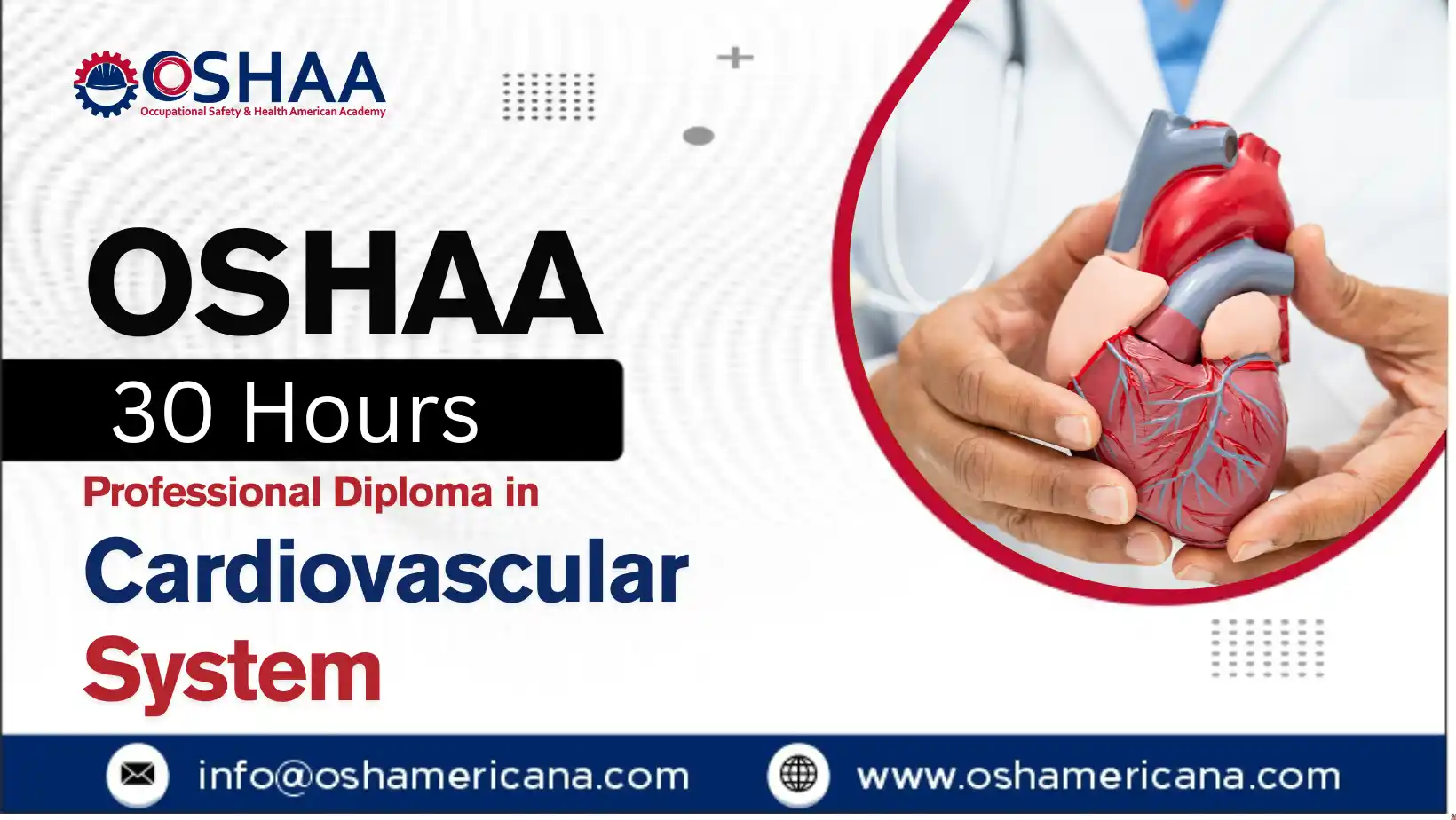Unlock the Science of the Heart with Diploma in Cardiovascular System
The cardiovascular system is at the core of human health, playing a vital role in sustaining life through the circulation of blood, oxygen, and nutrients. The OSHAA 30-Hours Professional Diploma in Cardiovascular System offers participants a comprehensive understanding of the anatomy, function, and clinical relevance of this essential system. Designed with a blend of foundational science and practical application, this diploma is ideal for those seeking to advance their knowledge in health, medicine, or fitness-related fields.
With cardiovascular conditions among the leading causes of mortality worldwide, a sound understanding of the heart and circulatory system is more important than ever. This course empowers participants with in-depth insights into cardiovascular structure and function, disease prevention, and the physiological adaptations of the system under different conditions, including physical activity and stress.
The OSHAA 30-Hours Professional Diploma in Cardiovascular System is structured to deliver essential knowledge of the heart, blood vessels, and the regulatory mechanisms that ensure effective circulation. Participants will explore topics such as cardiac anatomy, blood flow dynamics, blood pressure regulation, and the impact of lifestyle factors on cardiovascular health.
The OSHAA 30-Hours Professional Diploma in Cardiovascular System offers an accessible yet thorough exploration of a vital body system. With expert-designed content and real-world application, this course equips participants to better understand, communicate, and apply cardiovascular principles in their professional roles. The structured, flexible learning format ensures that the course fits into a variety of schedules and learning goals.
Following completion, participants may choose to expand their learning through related OSHAA programmes in exercise physiology, respiratory function, or chronic disease management. This diploma also serves as a strong foundation for advanced study in medical, allied health, or sports science fields.
OSHAA 30-Hours Professional Diploma in Cardiovascular System
Study Units
Learning Outcomes
Introduction to the Cardiovascular System and Its Functions (3 Hours)
- Understand the overall structure and role of the cardiovascular system
- Identify the primary functions of the heart, blood, and vessels in circulation
- Recognise the importance of cardiovascular health in maintaining overall wellbeing
Anatomy of the Heart: Chambers, Valves, and Circulation Pathways (3 Hours)
- Describe the internal and external structures of the heart
- Understand the function of heart chambers and valves in blood flow regulation
- Trace the pulmonary and systemic circulation pathways
Blood Vessels and Vascular Structure: Arteries, Veins, and Capillaries (6 Hours)
- Identify the structural differences between arteries, veins, and capillaries
- Understand how vascular structures support circulation and tissue perfusion
- Analyse the role of blood vessels in regulating blood pressure and flow
- Recognise factors that influence vascular resistance and vessel health
The Cardiac Cycle and Electrical Conduction System (4 Hours)
- Explain the phases of the cardiac cycle and their mechanical events
- Describe the electrical conduction system and its role in heart rhythm
- Interpret how disturbances in conduction affect cardiac function
Regulation of Heart Rate and Blood Pressure (3 Hours)
- Understand the neural and hormonal mechanisms that control heart rate
- Describe the short- and long-term regulation of blood pressure
- Analyse how external factors such as exercise and stress influence cardiovascular control
Blood Composition and Its Role in Cardiovascular Health (5 Hours)
- Identify the components of blood including red cells, white cells, platelets, and plasma
- Understand how blood contributes to oxygen transport, immune function, and clotting
- Evaluate how blood health impacts cardiovascular efficiency and disease risk
Cardiovascular Responses to Physical Activity and Stress (3 Hours)
- Describe acute and chronic cardiovascular responses to exercise
- Understand how stress influences heart rate, blood pressure, and vascular tone
- Apply knowledge to assess cardiovascular adaptation to training or stress exposure
Common Cardiovascular Diseases and Risk Factors (3 Hours)
- Identify major cardiovascular conditions such as hypertension, atherosclerosis, and heart failure
- Understand genetic, lifestyle, and environmental risk factors
- Explore prevention and early intervention strategies for cardiovascular disease management
Course Benefits – OSHAA 30-Hours Professional Diploma in Cardiovascular System
- Gain a comprehensive understanding of the cardiovascular system’s structure, function, and regulation
- Learn how the heart, blood vessels, and blood components work together to maintain circulation and health
- Understand how physical activity, stress, and environmental factors influence cardiovascular performance
- Develop the ability to recognise early signs of cardiovascular dysfunction and disease
- Explore common cardiovascular conditions and learn how to support prevention and risk reduction
- Acquire knowledge of diagnostic tools and their relevance in assessing heart and vascular health
- Enhance your ability to apply cardiovascular knowledge in fitness, healthcare, or rehabilitation settings
- Strengthen your professional credentials with a focused and scientifically grounded qualification
- Support career advancement in health sciences, exercise physiology, public health, and clinical support roles
- Achieve a recognised diploma that demonstrates your commitment to health education and professional development
This course is designed for individuals seeking to expand their knowledge of cardiovascular health, function, and disease prevention. It is particularly suitable for:
- Healthcare professionals aiming to strengthen their understanding of cardiovascular anatomy and physiology
- Fitness trainers, coaches, and exercise specialists supporting heart health through physical activity
- Rehabilitation practitioners and support staff working with clients recovering from cardiovascular conditions
- Public health professionals involved in health education, screening, or disease prevention initiatives
- Life science graduates or individuals preparing for further study in medicine, nursing, or allied health
- Anyone with a professional interest in promoting cardiovascular wellbeing across various populations
This diploma is accessible to participants from both clinical and non-clinical backgrounds, and no prior medical qualification is required. It provides practical, evidence-based knowledge relevant to a wide range of health and wellness professions.







